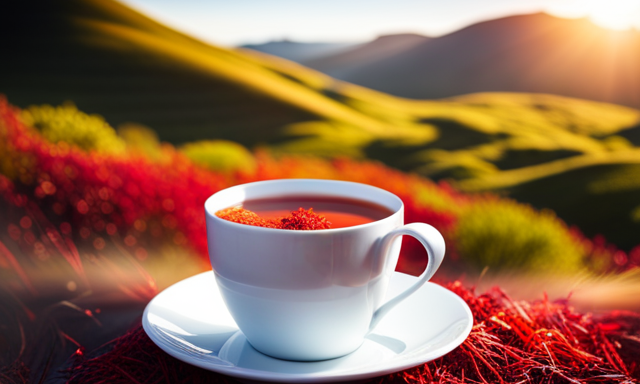Did you know that rooibos tea is not actually a tea at all, but rather an herbal infusion? It’s true! Rooibos, also known as ‘red bush,’ is a caffeine-free beverage that has been enjoyed for centuries due to its unique flavor and numerous health benefits.
In fact, studies have shown that rooibos is packed with antioxidants, which can help boost your immune system and protect against chronic diseases. Plus, its natural sweetness makes it a delightful alternative to sugary drinks.
In this article, I will take you on a journey to explore the history and origins of rooibos, the production process of this remarkable beverage, and the different types and flavors available. I will also share tips on how to incorporate rooibos into your daily routine and discuss the sustainability and ethical considerations surrounding its production.
Finally, I will highlight some popular brands and provide insights on where to buy the best rooibos tea. So, grab a cup of your favorite hot beverage and let’s dive into the wonderful world of rooibos!
Key Takeaways
- Rooibos tea is rich in antioxidants and can boost the immune system.
- Brewing methods for rooibos tea involve using boiling water and steeping for 5-7 minutes.
- The flavor of rooibos tea can be enhanced by adding sweeteners like honey, lemon, or milk.
- Rooibos tea can be used in various recipes such as smoothies, lattes, and cocktails.
History and Origins of Rooibos
So, let me tell you about the fascinating history and origins of rooibos. Rooibos, also known as red bush tea, has a rich history that dates back centuries. It originates from the Cederberg region of South Africa, where the indigenous Khoisan people first discovered its unique properties. The tea holds great cultural significance for the Khoisan, who have used it for generations due to its medicinal benefits and refreshing taste.
In the 18th century, European settlers started to recognize the potential of rooibos and began cultivating it commercially. Today, rooibos tea is enjoyed worldwide for its earthy flavor and numerous health benefits.
Now, let’s delve into the production process of this remarkable tea.
The Production Process of Rooibos Tea
To produce rooibos tea, the leaves are harvested, dried, and processed using traditional methods. Rooibos farming techniques involve carefully cultivating the Aspalathus linearis plant, which is native to the Cederberg region of South Africa. The leaves are harvested by hand, ensuring only the top leaves are plucked for optimal flavor.
After harvesting, the leaves are spread out to dry in the sun, allowing them to undergo a natural fermentation process. This fermentation process gives rooibos its distinctive reddish-brown color and enhances its flavor. Once the leaves are dried, they are then cut and sifted to remove any impurities. Finally, the leaves are packaged and ready to be brewed into a delicious cup of rooibos tea.
Moving on to the health benefits of rooibos, this unique tea offers a wide range of advantages for both physical and mental well-being.
Health Benefits of Rooibos
Rooibos tea, also known as red bush tea, offers numerous health benefits. It’s a rich source of antioxidants, helping to protect the body against free radicals and oxidative stress. Studies suggest that rooibos tea may have potential cancer-fighting properties and anti-inflammatory effects.
Antioxidant Properties
With its rich red hue and soothing aroma, rooibos tea is like a warm embrace from nature, delivering an abundance of antioxidants to nurture our bodies. Antioxidants are compounds that help protect cells from damage caused by free radicals, which are unstable molecules that can lead to various health issues. Research studies have shown that rooibos tea contains a range of antioxidants, including aspalathin and nothofagin, which have been associated with numerous health benefits. These antioxidants help to neutralize free radicals and reduce oxidative stress in the body. In fact, a study published in the Journal of Agricultural and Food Chemistry found that rooibos tea had higher antioxidant activity compared to green tea. This suggests that regularly consuming rooibos tea may support overall health and well-being. Moving on to its potential cancer-fighting properties, rooibos tea shows promise in ongoing research studies.
Potential Cancer-Fighting Properties
Research studies have revealed that the antioxidants present in rooibos tea have been linked to a reduction in oxidative stress, potentially lowering the risk of developing certain types of cancer. One interesting statistic shows that a study published in the Journal of Agricultural and Food Chemistry found that rooibos tea had higher antioxidant activity compared to green tea, emphasizing its potential cancer-fighting properties.
Here are four potential health benefits of rooibos tea supported by scientific research:
-
Protection against DNA damage: Rooibos tea contains compounds that can help prevent DNA damage, which is a key factor in the development of cancer cells.
-
Inhibition of tumor growth: Studies have shown that certain compounds in rooibos tea can inhibit the growth of cancer cells and prevent them from spreading.
-
Enhanced immune function: The antioxidants in rooibos tea can boost the immune system, helping the body fight off cancer cells and other harmful invaders.
-
Reduction of inflammation: Chronic inflammation is a known risk factor for cancer development, and rooibos tea has been found to possess anti-inflammatory effects.
These potential health benefits highlight the importance of further exploring the cancer-fighting properties of rooibos tea. Now, let’s delve into its anti-inflammatory effects.
Anti-inflammatory Effects
Immerse yourself in the soothing qualities of rooibos tea as it gently calms inflammation within your body, painting a picture of tranquility and healing. Rooibos tea has been found to possess anti-inflammatory effects, making it a valuable addition to your wellness routine.
The tea contains a unique blend of antioxidants, including aspalathin and nothofagin, which have been shown to reduce inflammation markers in the body. By sipping on a warm cup of rooibos tea, you can help alleviate symptoms of inflammation, such as pain and swelling, while promoting overall well-being.
It’s important to note that while rooibos tea is generally safe and well-tolerated, it may have potential side effects for some individuals, such as allergic reactions or interactions with certain medications. However, for most people, enjoying a cup of rooibos tea offers a natural and caffeine-free alternative to other beverages.
Transitioning into the next section about rooibos as a caffeine-free alternative, you’ll discover even more reasons to make this tea part of your daily routine.
Rooibos as a Caffeine-Free Alternative
Indulge in the comforting embrace of rooibos, a warm and soothing beverage that invites you to embrace a caffeine-free lifestyle. Rooibos, also known as red bush tea, offers a wealth of health benefits that set it apart from other herbal teas. Unlike its counterparts like green tea or chamomile, rooibos is naturally caffeine-free, making it an ideal choice for those looking to reduce their caffeine intake.
To give you a better understanding, let’s compare rooibos to other herbal teas:
| Rooibos | Green Tea | Chamomile | |
|---|---|---|---|
| Caffeine | Caffeine-free | Contains caffeine | Caffeine-free |
| Benefits | Anti-inflammatory | Antioxidant-rich | Relaxing and calming |
| Taste | Earthy and slightly sweet | Vegetal and slightly bitter | Floral and herbal |
As you can see, rooibos not only offers a caffeine-free alternative but also boasts its own unique set of health benefits. Now, let’s delve into the different types and flavors of rooibos.
Different Types and Flavors of Rooibos
As we discussed earlier, rooibos is a great caffeine-free alternative to traditional tea. Now let’s delve into the different types and flavors of rooibos.
Rooibos comes in various forms, including green rooibos, which is unfermented and has a slightly grassy taste, and red rooibos, which is fermented and has a rich, earthy flavor. Additionally, there are flavored rooibos teas that offer a wide range of tastes, from fruity blends to spicy infusions.
When it comes to brewing rooibos, there are a few different methods you can try. Some people prefer to steep it in boiling water for a few minutes, while others enjoy a longer infusion for a stronger flavor. It’s important to note that rooibos has numerous health benefits, such as being rich in antioxidants and aiding digestion, but it may also pose some risks for individuals with certain medical conditions.
Now, let’s move on to exploring the various brewing methods for rooibos tea.
Brewing Methods for Rooibos Tea
Explore the art of brewing a flavorful cup of rooibos tea by steeping the leaves in hot water and allowing the fragrant aroma to envelop your senses. To achieve the perfect brew, try these brewing techniques:
- Water temperature: Use boiling water to extract the full flavor of the rooibos leaves.
- Steeping time: Let the leaves steep for 5-7 minutes to ensure a robust infusion.
- Teapot or infuser: Use a teapot or an infuser to allow the leaves to expand and infuse properly.
- Sweeteners and additives: Rooibos tea is naturally sweet, but you can add honey, lemon, or milk to enhance the flavor according to your preference.
Not only does rooibos tea offer a delightful taste, but it also boasts numerous health benefits. It is rich in antioxidants, aids digestion, and may help reduce inflammation. Incorporating rooibos into your daily routine can be a simple and enjoyable way to promote overall well-being.
Incorporating Rooibos into Your Daily Routine
When it comes to incorporating rooibos into my daily routine, I love exploring different recipes that feature this unique tea. I enjoy rooibos-infused smoothies and rooibos latte. There are endless possibilities to enjoy this delicious and nutritious beverage.
I’ve also discovered the benefits of rooibos-infused skincare products, such as moisturizers and masks. They have become a staple in my beauty routine.
Rooibos Tea Recipes
Get ready to indulge in some delicious rooibos tea recipes that’ll leave your taste buds begging for more! Not only is rooibos tea incredibly tasty, but it also offers a myriad of health benefits.
Packed with antioxidants and nutrients, rooibos tea can boost your immune system, improve digestion, and even promote healthy skin.
Now, let’s explore some delightful rooibos tea recipes that you can easily incorporate into your daily routine.
Start your morning with a refreshing rooibos iced tea, or unwind in the evening with a soothing rooibos latte. For a unique twist, try a rooibos-infused cocktail with hints of citrus and herbs.
These recipes are not only delicious but also a great way to reap the many rooibos tea benefits.
So, let’s dive into the world of rooibos-infused products, from skincare to tasty treats!
Rooibos Infused Products (Skincare, etc.)
Now that we’ve explored some delicious rooibos tea recipes, let’s dive into the world of rooibos-infused products.
Not only is rooibos great for brewing a comforting cup of tea, but it also has numerous benefits when used in skincare and bath products. The antioxidant properties of rooibos make it a popular ingredient in lotions, creams, and soaps, helping to nourish and rejuvenate the skin.
Additionally, rooibos can be incorporated into cooking, adding a unique flavor and a hint of sweetness to dishes like sauces, marinades, and even desserts.
Whether you’re pampering yourself with a rooibos-infused bath or experimenting with rooibos in your culinary creations, this versatile plant offers a world of possibilities.
Now, let’s explore the sustainability and ethical considerations in rooibos production.
Sustainability and Ethical Considerations in Rooibos Production
Sustainability and ethical considerations are at the heart of rooibos production, making it a green and socially responsible choice. The rooibos industry in South Africa has implemented various sustainability practices to ensure the long-term viability of the plant. These practices include responsible water usage, organic farming methods, and promoting biodiversity in the region.
Additionally, many rooibos farms have obtained fair trade certification, ensuring that workers are treated fairly and receive fair wages.
When choosing rooibos products, it is important to support brands that prioritize sustainability and ethical practices. Some popular brands that meet these criteria include Numi Organic Tea, Yogi Tea, and Traditional Medicinals. These brands source their rooibos from sustainable farms and promote fair trade.
You can find a wide selection of rooibos tea and other rooibos-infused products at specialty tea stores, health food stores, and online retailers.
Moving on to popular brands and where to buy rooibos tea…
Popular Brands and Where to Buy Rooibos Tea
To discover the rich and comforting flavors of rooibos tea, you can easily find popular brands and indulge in a soothing cup at specialty tea shops, health food stores, or online retailers.
Some of the most popular brands of rooibos tea include Numi Organic Tea, Celestial Seasonings, and Twinings. These brands offer a wide variety of rooibos blends, from classic plain rooibos to unique flavor combinations like vanilla or chai.
Rooibos tea is known for its numerous health benefits, including its high levels of antioxidants and its ability to promote relaxation and improve digestion. So, not only can you enjoy the delicious taste of rooibos tea, but you can also reap its many health advantages.
In the next section, we will delve into the conclusion and final thoughts on rooibos tea, exploring its overall appeal and potential drawbacks.
Conclusion and Final Thoughts on Rooibos Tea
In the end, after exploring its numerous health benefits and wide availability, it becomes clear that indulging in a soothing cup of rooibos tea is like embracing a warm, comforting hug for both the body and the soul.
Rooibos tea offers a range of benefits that make it a popular choice among tea enthusiasts. It’s packed with antioxidants that can help boost the immune system and protect against diseases. Additionally, rooibos tea is caffeine-free, making it a great alternative for those looking to reduce their caffeine intake. It’s also known to promote good digestion and relieve stomach cramps.
When it comes to flavors, rooibos tea offers a delightful variety. From the earthy and nutty taste of natural rooibos to the fruity and floral notes of flavored rooibos blends, there’s something for everyone.
So why not treat yourself to a cup of rooibos tea and experience its wonderful benefits and flavors?
Frequently Asked Questions
Is rooibos tea safe for children to consume?
Rooibos tea is safe for children to consume and offers numerous benefits. It is caffeine-free, rich in antioxidants, and can promote better sleep and digestion. However, it’s important to consult a pediatrician before giving it to toddlers.
Can rooibos tea be used as a natural remedy for common ailments?
Rooibos tea is a miraculous remedy for all ailments! Its numerous benefits include boosting immunity, reducing inflammation, and promoting better sleep. Try these delicious rooibos tea recipes for a natural, healthy way to combat common health issues.
Does rooibos tea have any known side effects or interactions with medications?
Rooibos tea has no known side effects or interactions with medications. It is safe to consume during pregnancy and may even have benefits for liver health.
Can rooibos tea be used as an ingredient in cooking or baking?
Sure, rooibos tea is a versatile ingredient for cooking and baking. It adds a unique flavor and depth to dishes. From marinades to desserts, the possibilities are endless. Get creative and explore the delicious world of cooking with rooibos tea!
Are there any specific storage recommendations for preserving the flavor and quality of rooibos tea?
To preserve the flavor and quality of rooibos tea, it is important to follow proper storage techniques. This includes storing it in an airtight container, away from light and moisture. These best practices will help maintain its freshness and taste.
Conclusion
In conclusion, I must say that rooibos tea is truly a remarkable beverage. Its rich history and origins, along with its unique production process, make it a tea like no other.
The health benefits of rooibos are numerous, and its caffeine-free nature makes it a perfect alternative for those looking to reduce their caffeine intake.
With a wide variety of types and flavors available, there’s a rooibos tea for everyone’s taste. So why not incorporate this wonderful tea into your daily routine?
As the old adage goes, "A cup of rooibos a day keeps the doctor away." Cheers to a healthier and more enjoyable tea-drinking experience!










